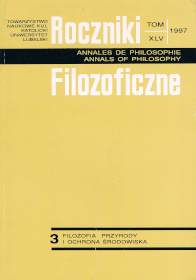Homo Faber w aspekcie kulturowym
Abstrakt
Development of technology and industrial civilization created a new kind of human being − the technical man (Homo Faber). He has two dimensions: one individual and another that of the crowd. In the second aspect Homo Faber creates civilization of technology. It is proper environment of life and activity for a technical man. Civilization of technology has some features, which influence the personality, mentality and behavior of Homo Faber. In the individual dimension Homo Faber, is a man who has been involved in technology (engineering). For him technology has become way and strategy of life; it is an entity which constitutes his being and determinates his culture. The technology makes an artificial human world which contradicts the world of nature. It is also the world of a new culture − the technical one.
Cultural environment of technical man contains four areas: science, morality art and religion. They constitute also four basic circles of activity of Homo Faber. Each of they strongly modifies human being.
Homo Faber and science
Relationship between science and technology had led to such economical and social structures that − on their ground − it was possible to built a civilization of technology. In this context, occured some changes of relation between culture and science. The culture ceased to exercise the protective role for human community.
Technical civilization makes tools to manipulate human being. This state of affairs forms premisses (circumstances) of dehumanization of the world, erosion of sense, injures human identity etc... The culture begins to maintain practical role in the industrial society. It is responsible for the transformation of the world into more and more artificial environment. Its task is also to make inside the human being a new kind of loyalty in relation to the State and Community. The outcome of this activity is degradation of human spirit, alienation, brutalization of life and revolt against science.
Homo Faber and morality
Technical man has a corresponding morality. There is difficulty in definition of this morality. It contains some elements from existing moral order and some new features formed by technological mentality. In the morality of Homo Faber, the priority is not human good (benefit) but development of technology. Also the range (field) od freedom of human being involved in the technological order became more and more limited. His morality is strictly secular and agnostic. Moral choices of a technical man are incomplete (defective), occasional and utilitarian (useful). There are a lot of lawlessness, lack of depth etc, in the morality of Homo Faber. Technical man undergo severe crisis of morality. This crisis becomes evident in the example of postindustrial culture. The postindustrial culture preaches individualism as liberation from all moral and psychological restrictions (limitations). There is no area of life which is protected against this interference of Homo Faber. The consequences of abuse of liberty (hiper-freedom) are very serious. There are more and more examples of neurosis and social unadaptability of a technical man which is the consequence of an absence of the proper to human being frame of reference and subject of worship.
Homo Faber and art
Together with the development of technology manifests itself the political dimention of art. Art becomes gradually politicised. The artist-technician developes conviction, that art opens the way to modernity and perform a role of vanguard (forefront) of mankind. The art attempts to give a new patterns of behavior in the area of morality, customs and also policy. Homo Faber pays for this conditions by a brakedown (ruine) of artistic culture. There is no concern about change of taste but a radical doubt and consideration of uncertainty. We witness this state of matter in the abstract painting and a slogan of anti-art as well as in the naturalistic approach to art (kitsch).
Homo Faber and religion
Religion is a focus of culture. Meanwhile for the technical man, it is very hard to enter in to the sphere of religion because the civilization of technology satisfies (gratifies) a lot of his needs. Homo Faber underwent process of desacralization and secularization. This development led to the secularization of culture. It is an atheistic one. In dispite of exclaimed about this culture slogans of freedom and liberation, it gives man nothing but enslaves and degrades Homo Faber the „hollow man” of existencial emptiness (of existential void) („hollow man” of T. S. Elliot poem The Wasted Land). The secular culture creates also ground for rise of various forms of semireligion and cults. The reason of this approach is a spiritual void and urgency felt by Homo Faber to gratify the desire for „sacrum”. An exclusive reliance on a technological culture is a self-destruction of a man. If Homo Faber likes to survive, he must build based on a authentic religious values, new civilization − „civilization of love”.
Copyright (c) 1997 Roczniki Filozoficzne

Utwór dostępny jest na licencji Creative Commons Uznanie autorstwa – Użycie niekomercyjne – Bez utworów zależnych 4.0 Międzynarodowe.





